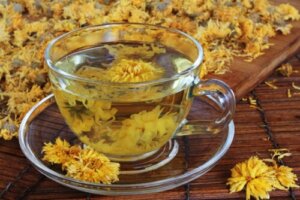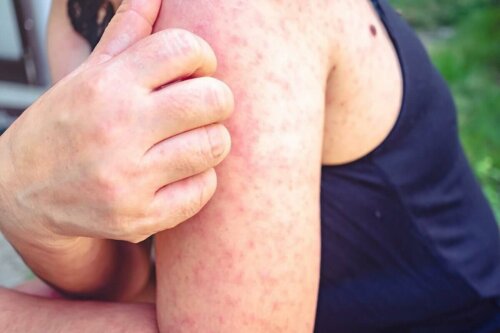Chrysanthemum Tea: Benefits and Precautions


Reviewed and approved by the pharmacist Franciele Rohor de Souza
Chrysanthemum tea is a natural drink that you can make from the dried flowers of the plant. Defined by its light golden tone, it boasts a soft and floral taste that’s similar to that of chamomile. Have you heard about its properties?
An article published in the Molecules Journal claims that this plant is a natural source of flavonoids, anthocyanins, linaria, and other compound antioxidants that are beneficial for our health. Also, many people believe it has anti-inflammatory, relaxing, and antihypertensive properties.
As such, it’s not surprising that many people consider that it helps promote well-being and reduce the risk of illnesses. Although it doesn’t replace medical treatments, it can act as an ally for some pains. Below, we’ll tell you all about its benefits and contraindications.
Medicinal properties of chrysanthemum tea
A large part of the health benefits of chrysanthemum tea come from its antioxidant and anti-inflammatory properties. According to a study in Food Chemistry, the phenolic compounds, glucosides, and organic acids are behind this medicinal potential.
In particular, specialists have found that this drink helps to inhibit the negative effects of free radicals, inflammation, and the growth of abnormal cells. Also, they note it has antipyretic, antiarthritic, sedative, neuroprotection, antihypertensive, and antiallergic activity.
You may also be interested in: 5 Different Ways to Make Flowers with Decorative Materials
Benefits of chrysanthemum tea
In traditional Chinese medicine, people have been using chrysanthemum tea since ancient times to calm a large variety of pains. In fact, even today, it’s a valid option for problems like high blood pressure, hyperthyroidism, and respiratory and nervous system disorders.
And, although the scientific evidence is limited, several investigations support the claims regarding the properties people believe it to have. Of course, it isn’t currently considered a first-line treatment for illnesses; specialists are still investigating its effects. But, that aside, what would specialists recommend it for?

Against inflammation
Excess inflammation in the body is the cause of many illnesses. It doesn’t just influence joint and muscle issues, but it can also lead to cardiac and brain problems. Fortunately, an investigation in Bioorganic & Medicinal Chemistry Letters found that certain chemical substances in chrysanthemum tea combat inflammation.
Specifically, octulosonic acid, chrysanol A (1), and 17 other compounds are responsible for this effect. Previous studies like one published in The AAPS Journal, support this and suggest that it can help to reduce the risk of chronic illnesses.
For bone health
Chrysanthemum tea isn’t a miracle remedy against the illnesses that affect bone health. Despite that, it seems to contribute to looking after the bones and reducing the risk of osteoporosis, according to a study published in Evidence-Based Complementary and Alternative Medicine.
The investigation concluded that extracts from the plant helped to regulate bone remodeling as they inhibited the differentiation and function of osteoclasts. Additionally, they stimulate the function of osteoblasts. And, although there haven’t been many clinical trials on this, specialists believe that in the future it may be a good therapeutic agent against bone diseases.
Skincare
You can enjoy the antibacterial and anti-inflammatory properties of chrysanthemum on an aesthetic level. A study in the Journal of Cosmetic Dermatology found that mixtures that contained chrysanthemum helped to reduce marks on the skin as they reduce melanin.
As part of these studies, Evidence-Based Complementary and Alternative Medicine noted that applying this plant topically helped to reduce symptoms of skin injuries similar to those caused by atopic dermatitis. In turn, anecdotal data claims that it can be useful against spots and acne.
Other possible benefits
According to tradition, people use chrysanthemum tea for many other medicinal reasons. However, there isn’t a lot of evidence to supports its efficiency. That so, it’s still a popular remedy in oriental countries as much as it is in the west.
- Due to its low calorific value and high antioxidant content, people recommend this drink for weight loss. Although on its own it doesn’t have any relevant effects, it can help if you include it in a balanced diet.
- People also use chrysanthemum tea in aromatherapy to reduce blood pressure and promote relaxation. It’s recommended for dealing with stress-induced symptoms.
- It has antipyretic properties, and, as a result, it can help to alleviate fever.
- It reduces mental exhaustion and improves concentration. Also, in studies conducted on animals, it demonstrates the potential to protect the brain.
Discover more: Try this Amazing Tea with Tangerine Peel, Valerian Root, and Chamomile to Calm Your Nerves
Precautions and side effects of chrysanthemum tea
For most healthy adults, chrysanthemum tea is safe as long as you take it in moderation. However, specialists advise against people taking it if they’re allergic to daisies or ambrosia. It’s vital that you stop using it if you notice any symptoms like rashes or trouble breathing.
Alternatively, you should remember that it can interact with prescribed medication. For that reason, if you’re undergoing medicinal treatment (with anti-inflammatories, anticarcinogens, antibacterials, etc), it’s best to consult your doctor. They’re likely to advise against you taking them in the following situations:
- Pregnancy or breastfeeding
- Diabetes
- Skin sensitivity
- Diagnosed hypertension
It’s also worth mentioning that regularly consuming chrysanthemum tea is linked to photosensitivity. By this, we mean a high sensitivity to light. For that reason, if you do consume this drink regularly, you should be careful when in the sun (using sunblock and glasses).

How to prepare chrysanthemum tea
You can usually find chrysanthemum tea that’s ready to prepare in herbal shops. However, you can also create your own from dried chrysanthemum flowers. If you choose to do it yourself, consider the following:
Ingredients
- 1 tablespoon of dried chrysanthemum flowers
- 1 cup of water (1/2 pint)
Preparation
- Boil the cup of water and once it reaches boiling, add the dried chrysanthemum flowers.
- Lower the heat and allow to boil for one more minute.
- Then turn off the heat and allow it to steep for 10 minutes.
- Strain and enjoy.
- Take up to 2 glasses a day.
The appropriate dosage of chrysanthemum tea hasn’t yet been determined by scientific data. The amount can vary according to factors like age, state of health, and other conditions. For that reason, we recommend you consult a doctor before you start drinking it regularly.
All cited sources were thoroughly reviewed by our team to ensure their quality, reliability, currency, and validity. The bibliography of this article was considered reliable and of academic or scientific accuracy.
- Han AR, Nam B, Kim BR, et al. Phytochemical Composition and Antioxidant Activities of Two Different Color Chrysanthemum Flower Teas. Molecules. 2019;24(2):329. Published 2019 Jan 17. doi:10.3390/molecules24020329
- Li Y, Yang P, Luo Y, Gao B, Sun J, Lu W, Liu J, Chen P, Zhang Y, Yu LL. Chemical compositions of chrysanthemum teas and their anti-inflammatory and antioxidant properties. Food Chem. 2019 Jul 15;286:8-16. doi: 10.1016/j.foodchem.2019.02.013. Epub 2019 Feb 12. PMID: 30827670.
-
Luyen BT, Tai BH, Thao NP, Cha JY, Lee HY, Lee YM, Kim YH. Anti-inflammatory components of Chrysanthemum indicum flowers. Bioorg Med Chem Lett. 2015 Jan 15;25(2):266-9. doi: 10.1016/j.bmcl.2014.11.054. Epub 2014 Nov 27. PMID: 25497988.
- Wu TY, Khor TO, Saw CL, et al. Anti-inflammatory/Anti-oxidative stress activities and differential regulation of Nrf2-mediated genes by non-polar fractions of tea Chrysanthemum zawadskii and licorice Glycyrrhiza uralensis. AAPS J. 2011;13(1):1-13. doi:10.1208/s12248-010-9239-4
-
Baek, J. M., Kim, J.-Y., Cheon, Y.-H., Park, S.-H., Ahn, S.-J., Yoon, K.-H., Oh, J., & Lee, M. S. (2014). Dual Effect ofChrysanthemum indicumExtract to Stimulate Osteoblast Differentiation and Inhibit Osteoclast Formation and ResorptionIn Vitro. Evidence-Based Complementary and Alternative Medicine, 2014, 1–13. https://doi.org/10.1155/2014/176049
-
Choi KT, Kim JH, Cho HT, Lim SS, Kwak SS, Kim YJ. Dermatologic evaluation of cosmetic formulations containing Chrysanthemum indicum extract. J Cosmet Dermatol. 2016 Jun;15(2):162-8. doi: 10.1111/jocd.12211. Epub 2016 Jan 20. PMID: 26786567.
- Park S, Lee JB, Kang S. Topical Application of Chrysanthemum indicum L. Attenuates the Development of Atopic Dermatitis-Like Skin Lesions by Suppressing Serum IgE Levels, IFN-γ, and IL-4 in Nc/Nga Mice. Evid Based Complement Alternat Med. 2012;2012:821967. doi:10.1155/2012/821967
- Cha JY, Nepali S, Lee HY, et al. Chrysanthemum indicum L. ethanol extract reduces high-fat diet-induced obesity in mice. Exp Ther Med. 2018;15(6):5070-5076. doi:10.3892/etm.2018.6042
- Kim DS, Goo YM, Cho J, et al. Effect of Volatile Organic Chemicals in Chrysanthemum indicum Linné on Blood Pressure and Electroencephalogram. Molecules. 2018;23(8):2063. Published 2018 Aug 17. doi:10.3390/molecules23082063
-
Lin GH, Lin L, Liang HW, Ma X, Wang JY, Wu LP, Jiang HD, Bruce IC, Xia Q. Antioxidant action of a Chrysanthemum morifolium extract protects rat brain against ischemia and reperfusion injury. J Med Food. 2010 Apr;13(2):306-11. doi: 10.1089/jmf.2009.1184. PMID: 20412018.
This text is provided for informational purposes only and does not replace consultation with a professional. If in doubt, consult your specialist.








